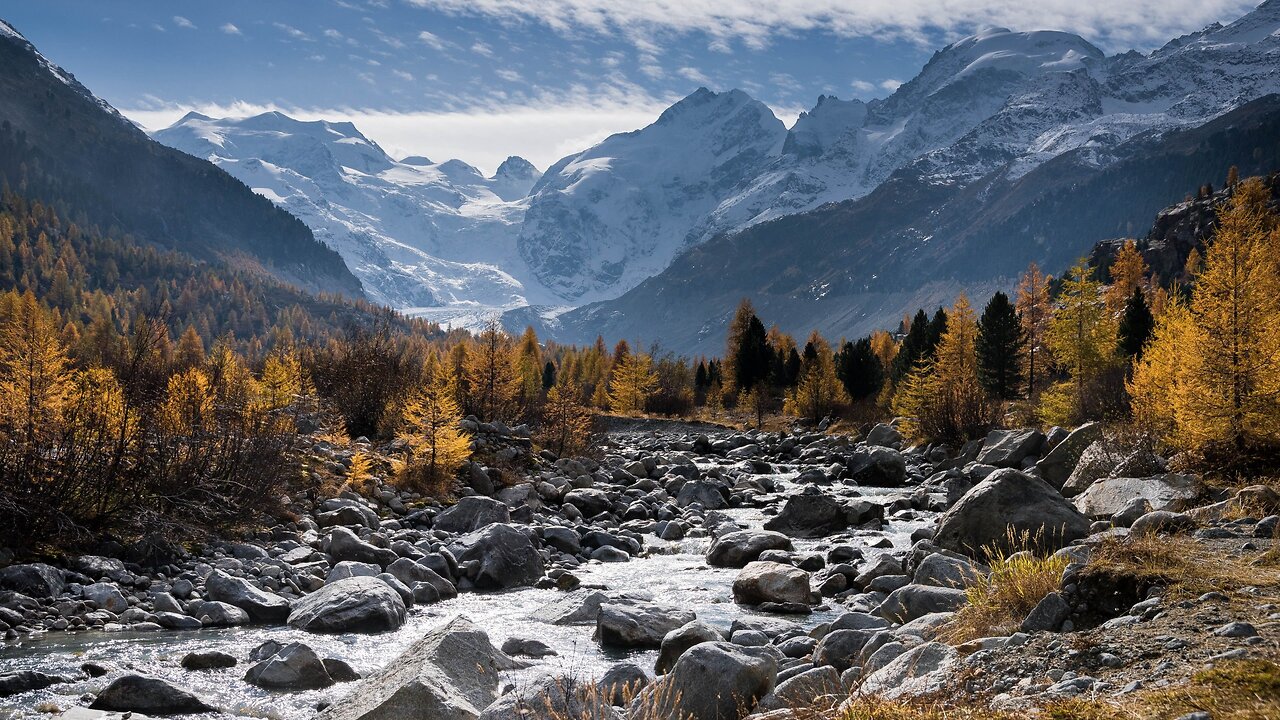Premium Only Content

Mountains and its beauty #20
2 / 2
Natural mountains are majestic and awe-inspiring landforms that rise proudly from the Earth's surface. They are among the most captivating features of our planet's landscape, exhibiting a blend of rugged beauty and ancient history. Here's a description of natural mountains:
Majestic Presence: Mountains stand tall and grand, dominating the horizon with their soaring peaks and imposing silhouettes. Their majestic presence commands attention and evokes a sense of wonder and reverence in those who behold them. The sight of mountains against the sky often leaves people humbled by the vastness of nature.
Diverse Shapes and Profiles: Mountains come in a wide variety of shapes and profiles, each unique and characteristic of the geological forces that shaped them. From sharp, jagged summits to gently rolling foothills, each mountain range tells a different story of Earth's geological history.
Breath-taking Scenery: The landscapes surrounding mountains are some of the most stunning on the planet. Snow-capped peaks, deep valleys, lush forests, cascading waterfalls, and meandering rivers create a breathtaking tapestry of natural beauty. The scenery changes with the seasons, offering a constant source of wonder and visual delight.
Biodiversity Hotspots: Mountains are often biodiversity hotspots, harboring a diverse array of plant and animal species. As altitude increases, distinct ecosystems emerge, and unique flora and fauna adapt to the challenging conditions. Many species are endemic to specific mountain ranges, making them essential for preserving Earth's biological diversity.
Geological History: Mountains are living records of Earth's geological history, formed through the movement of tectonic plates, volcanic activity, and erosion over millions of years. The rocks and minerals found in mountain ranges provide valuable insights into the planet's geological evolution, offering geologists a window into its ancient past.
Outdoor Adventure: For adventurous souls, mountains present a playground for exploration and outdoor activities. Hiking, mountaineering, rock climbing, skiing, and snowboarding are just a few of the thrilling pursuits that attract enthusiasts to these rugged terrains. The challenges and rewards of conquering a mountain peak are unparalleled experiences.
Spiritual and Cultural Significance: Throughout human history, mountains have held spiritual and cultural significance for various societies. Many cultures consider mountains as sacred places, centers of worship, or symbols of strength and endurance. They have often been the setting for myths, legends, and religious narratives.
Climate and Water Regulators: Mountains play a vital role in regulating climate and water systems. They influence weather patterns, act as natural barriers to wind and precipitation, and are often the source of major rivers that sustain life in surrounding lowlands. Mountain regions play a crucial role in maintaining global climate stability.
Inspirational Landmarks: Mountains have been a source of inspiration for artists, poets, writers, and thinkers throughout history. Their beauty and symbolism have been immortalized in countless works of art, literature, and cultural expressions, reflecting their profound impact on human imagination.
Natural mountains are not only geographical features but also symbolic embodiments of the Earth's power and resilience. They remind us of the forces that shape our world and inspire us to connect with nature, seek adventure, and appreciate the wonders of our planet.
-
 LIVE
LIVE
VapinGamers
2 hours ago📣 Fortnite Family Night! - Games and Dubs with BrianZGame - !rumbot
110 watching -
 LIVE
LIVE
ThePope_Live
1 hour agoLIVE - First time playing The Finals in over a YEAR! Still good? with @Arrowthorn
62 watching -
 DVR
DVR
TruthStream with Joe and Scott
7 hours agoRoundtable with Patriot Underground and News Treason Live 4/26 5pm pacific 8pm Eastern
5.1K3 -
 8:52
8:52
Tundra Tactical
4 hours ago $7.04 earnedSCOTUS Denies Appeal, Minnesota Courts Deal 2a Win!
17.3K7 -
 LIVE
LIVE
a12cat34dog
6 hours agoONE WITH THE DARK & SHADOWS :: The Elder Scrolls IV: Oblivion Remastered :: FIRST-TIME PLAYING {18+}
256 watching -
 22:27
22:27
Exploring With Nug
13 hours ago $11.06 earnedSwamp Yields a Chilling Discovery in 40-Year Search for Missing Man!
33.3K17 -
 1:23:26
1:23:26
RiftTV/Slightly Offensive
8 hours ago $9.33 earnedThe LUCRATIVE Side of Programming and the SECRETS of the "Tech Right" | Guest: Hunter Isaacson
47.5K16 -
 27:57
27:57
MYLUNCHBREAK CHANNEL PAGE
1 day agoDams Destroyed India
58.7K19 -
 LIVE
LIVE
Phyxicx
8 hours agoLast minute practice before Sunday - 4/26/2025
261 watching -
 LIVE
LIVE
The Official Steve Harvey
10 days ago $4.64 earned24 HOURS OF MOTIVATION w/ STEVE HARVEY
84 watching